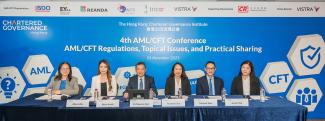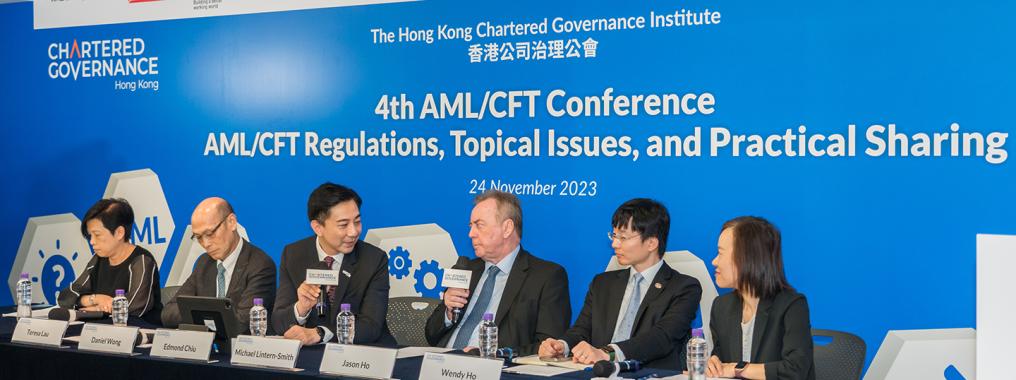This second and final part of our review of the Institute’s latest AML/CFT conference looks at the latest global developments in anti–money laundering and counter–financing of terrorism (AML/CFT).
AML/CFT practitioners in Hong Kong cannot afford to focus solely on local developments. Money laundering and terrorist financing are global in their extent and combatting their spread requires an internationally coordinated response. With this aim, the Financial Action Task Force (FATF), the global money laundering and terrorist financing watchdog, was set up in 1989 to establish global standards in AML/CFT. This second and final article in our two-part review of the Institute’s latest AML/CFT conference looks at the key takeaways relating to global developments impacting practitioners in Hong Kong.
Beneficial ownership
The first speaker in Session Two of the conference, Amanda Diep, Regional Compliance Director, North Asia, Vistra, focused on the changing global AML/CFT landscape. She started by pointing out that trust or company service providers (TCSPs) play a crucial role in combatting money laundering and terrorist financing activities. For this reason, TCSPs are subject to increasing expectations regarding their AML/CFT due diligence work. Globally, these expectations are largely the result of the work of FATF, but Ms Diep observed that FATF’s standards have not been applied worldwide.
‘You might assume that TCSPs are subject to increasing regulation to prevent money laundering, terrorist financing and other illicit activities as per the FATF standards, but in the global landscape that may not always be the case. Not all jurisdictions regulate TCSPs and this creates an imbalance around the globe,’ she said.
She added that TCSPs need to be keenly aware of the revised FATF standards regarding beneficial ownership disclosure. Money laundering operations frequently use shell companies and complex ownership and control structures to disguise ultimate beneficial ownership. Promoting better transparency of beneficial ownership information has therefore been an integral part of the evolving international AML/CFT standards.
Ms Diep explained that, in the last couple of years, FATF has revised its guidance on beneficial ownership–in particular, via revisions to its Recommendations 24 and 25. In general, the emphasis is on the need to determine substantive beneficial ownership and control, rather than on purely legal arrangements. To be effective and meaningful, beneficial ownership must not be reduced to a legally defined position, such as a director or foundation, or a shareholder who owns more than a certain percentage of shares or legal entitlement/benefit of a trust. In identifying the beneficial owner, priority should be placed on two factors – the control exercised and the benefit derived.
The FATF revisions to Recommendation 24 explicitly require countries to use a multipronged approach. This means using a combination of different mechanisms and different sources to ensure the accuracy of beneficial information by cross-checking. The onus is not only on beneficial ownership registries to ensure their data is adequate, accurate and up to date through verification, but designated non-financial businesses and professions, as well as financial institutions, are also responsible for identifying incorrect beneficial ownership information in their databases and for seeking clarifications and, where necessary, reporting suspicious activities to competent authorities.
This new focus has prompted some jurisdictions to tighten their rules on beneficial ownership transparency. The UK developed legislation in 2023 that will require beneficial owners to submit more information and allow third parties to verify it. In the US, the Treasury Department’s Financial Crimes Enforcement Network created a new rule that will require most corporations, limited liability companies and others registered for business in the US to report information about their beneficial owners. The reporting requirement, created to implement the 2021 Corporate Transparency Act, is set to take effect in January 2024, and will give both banks and legal authorities varying degrees of access to the collected data.
Ms Diep also discussed the European Court of Justice Ruling of 22 November 2022, which blocks public access to beneficial ownership registries in the EU on the basis of its interference with the rights to privacy and personal data protection under the EU Charter of Fundamental Rights. The ruling limits access to those that can be said to have a ‘legitimate interest’ in such information. The court confirmed that journalists and civil society organisations that investigate or campaign on crime and corruption, as well as financial institutions and other entities with AML obligations, have a legitimate interest in access to beneficial ownership information.
not all jurisdictions regulate TCSPs and this creates an imbalance around the globe
Amanda Diep
Regional Compliance Director, North Asia, Vistra
Identifying the source of funds in trusts
The second speaker in Session Two, Michael Shue, Managing Director – Trust Services, Tricor Services Ltd, concentrated his presentation on the challenges faced by TCSPs in identifying the source of funds in trusts.
‘Understanding the source of your customers’ funds and wealth is a crucial aspect of know your customer (KYC) and customer due diligence (CDD) measures,’ he said. He made a distinction between ‘source of funds’ (the origin of the money used in a particular transaction) and ‘source of wealth’ (the origin of all the money a person has accumulated over their lifetime).
So how can TCSPs trace and assess the legitimacy of the source of funds? Mr Shue offered a number of practical insights into this challenge, but at the outset he warned practitioners against assuming that they can rely on the due diligence that banks may have done in relation to funds in their custody.
‘As trustees we tend to think that if investment funds are held through a bank we can assume that the bank has done its due diligence and gone through a rigorous process of checking the legitimacy of the source of funds and the source of wealth. However, trustees should not automatically assume that this is the case and should always carry out their own due diligence,’ he said.
The main issue for practitioners is what level of detail the verification process should involve. For example, where funds are derived from inheritance under a will or intestacy, should trustees check the origins of the estate, and how and from where they were sourced? How many generations should they trace the funds back to?
‘If we are looking at assets that have been passed on from generation to generation, it’s very difficult to know whether those assets were originally derived from illegal criminal activities,’ Mr Shue said.
The availability of reliable data is also an issue. Funds derived from salaries, savings and property sales will usually have reliable sources of data–pay slips, tax returns, employment contracts, bank statements, sale and purchase agreements, etc. But where the assets have come from another trust, particularly where that trust structure is highly complex, checking the origins of the assets and tracking the flow of funds on an ongoing basis may be a challenge.
‘Quite often we as trustees may not have visibility in terms of what’s going on underneath these trust structures,’ Mr Shue said.
This is also true where the funds are in the form of cryptocurrencies. As cryptocurrency assets are often considered to be the preferred asset class for criminal activities, Mr Shue added that trustees tend to be wary of any cryptocurrencies going into their trusts.
Finally, Mr Shue emphasised that practitioners need to recognise that due diligence is a continuous process. ‘CDD is not only relevant when we’re setting up a trust or handling the ongoing administration of the trust – we also need to continue to monitor the flow of funds that are going into trust structures,’ he said.
CDD is not only relevant when we’re setting up a trust or handling the ongoing administration of the trust – we also need to continue to monitor the flow of funds that are going into trust structures
Michael Shue
Managing Director – Trust Services, Tricor Services Ltd
FATF update
The third speaker in the second session of the conference, Nicky Kwok, Assistant Manager of Risk Advisory, BDO Ltd, gave an update on the work of FATF. In particular, she highlighted the strong focus FATF has had on extending its global AML/CFT standards to virtual assets (VAs) and virtual asset service providers (VASPs).
VA transactions often involve pseudonymous or anonymous participants, which can make it challenging for TCSPs to identify the parties involved and assess their legitimacy. Moreover, not all jurisdictions have AML/CFT regulations in place relating to VAs. Compliance in the VA sector still generally lags behind other areas. Indeed, 75% of jurisdictions assessed are deemed to be non-compliant or partially compliant with the relevant FATF recommendations.
In February 2023, FATF adopted a roadmap to June 2024 to improve implementation of Recommendation 15 (R15), which states that VASPs should be regulated and licensed for AML/CFT purposes, and that they should be subject to effective systems for monitoring and supervision. This was followed in June 2023 by a targeted update on the implementation of FATF standards in this area.
These developments are of particular relevance to Hong Kong, Ms Kwok pointed out, since the latest FATF follow-up report on Hong Kong – issued in February 2023 as part of the FATF mutual evaluation report (MER) process–includes a downgrading of Hong Kong to ‘partially compliant’ from ‘largely compliant’ with respect to R15.
Overall, however, Hong Kong has made progress in addressing the technical compliance deficiencies identified in the original 2019 MER. Indeed, it was upgraded during the recent follow-up report on Recommendation 28, which relates to the regulation of designated non-financial business and professions.
Ms Kwok clarified that, at the time of the follow-up assessment, only centralised VA exchanges trading security tokens were subject to supervision in Hong Kong, limiting the scope of entities covered. The Anti–Money Laundering and Counter-Terrorist Financing (Amendment) Ordinance 2022 (Revised AMLO), which took effect in June 2023, extends supervision to centralised VA exchanges trading non-security tokens. Moreover, the implementation of the new licensing regime for VASPs should mean that Hong Kong now meets the revised requirements of R15.
The Institute’s 4th AML/CFT Conference was held on 24 November 2023 in hybrid mode. More information is available on the Institute’s website: www.hkcgi.org.hk.
SIDEBAR: Credits
The Institute would like to thank everyone who contributed to its 4th AML/CFT Conference. In addition to the speakers quoted in this and the previous cover story in this month’s edition of CGj, the Institute would like to thank the members and practitioners named below (in order of appearance) for their contributions to the debate.
Welcoming Address
Ernest Lee FCG HKFCG(PE), Institute President, and Technical Partner, Deloitte China
Session One Chair
Edmond Chiu FCG HKFCG(PE), Institute Council member and Chairman of the Professional Services Panel, and Head of Corporate and Fund Services, Vistra Corporate Services (HK) Ltd
Session One Panellists
Wendy Ho FCG HKFCG(PE), Institute Council member and Chairman of the Professional Development Committee, and Executive Director, Corporate Services, Tricor Services Ltd
Teresa Lau ACG HKACG, Institute Vice-Chairman of the Professional Services Panel, and Director and Head of Corporate Secretarial Services, BDO Ltd
Session Two Chair
Dr Maurice Ngai FCG HKFCG(PE), Institute Past President and Vice-Chairman of the Professional Services Panel, and Director and Group CEO, SWCS Corporate Services Group (Hong Kong) Ltd
Session Two Panellists
Jenny Choi FCG HKFCG(PE), Partner, Entity Compliance & Governance Leader, Ernst & Young Company Secretarial Services Ltd
Alberta Sie FCG HKFCG(PE), Director and Company Secretary, Reanda EFA Secretarial Ltd



